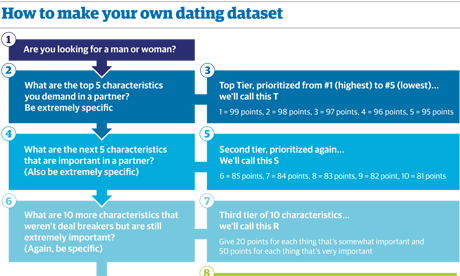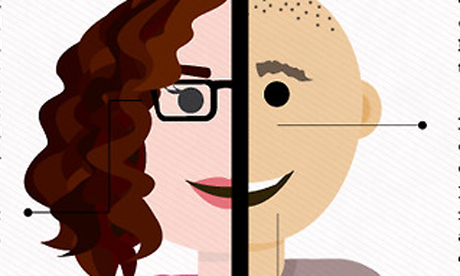Why data is the secret to successful dating
These days, we're promised true love via algorithm. Log on to a website, enter in some data and – voila! – our soul mate will automagically appear.
Algorithm is really just a fancy name for the step-by-step process and calculations that are used while solving a problem. Think of an algorithm as you would a recipe for croissants. You need a set of ingredients: yeast, water, sugar, salt, flour, milk, oil, butter, and eggs. And you need a bunch of kitchen equipment: bowls, mixers, knife, baking sheet, oven, and some towels. Depending on how you put everything together, you could wind up with a flaky, delicate pastry or a hard lump of charred dough.
Algorithms are a shorthand way of writing out workflows. They're the step-by-step processes scientists use to think through complex problems, and the instructions that are given to computers to help process the results. In online dating, algorithms are what help sort through all of the data we're inputting, and they're what ultimately match us with others using the same service. In theory, whichever site has the best algorithm should be able to provide the best match.
Get your physical appearance description right. Click image to see infographic
If you asked a Jewish shadchen or a Chinese fortune-teller to write down their matchmaking methods, the resulting diagram would be a kind of algorithm.
The shadchen would factor in a number of variables and would weigh each one according to priority. What did the community and rabbi think? Could the couple have children? What attributes did the families share? Then she'd consider how well the couple and their families might get along. Though she would never write down her decision-making process as a formula or use numerical values to predict a successful union, her blessing would be given based on how well a couple scored using the rudimentary algorithm she had in her head.
Modern dating sites all promise top-secret magic algorithms that solve for what's referred to in the dating industry as the tyranny of choice. With millions of profiles logged in to online databases, there is a glut of choices. Surrounded by too many options, we become paralyzed, overwhelmed, and unable to make a decision. Some of us begin to think that we have infinite opportunities and become lured by the prospect of bigger, better deals. Others just want out, so they're willing to settle for someone who seems good enough at that moment in time.
The process of creating a successful dating site happens in many steps. Developing a set of algorithms is the start. Equally important is the data itself. It turns out that the design of a dating website and how it manages data collection is significantly more important than the algorithms alone in determining successful matches.
Dating sites require a steady stream of user data in order to function. They're hungry beasts that need constant feeding. How we enter our information and create our profiles is what differentiates each one of the dating services.
All of the major players in the online dating space tout their super-fantastic algorithms. But if technology has become as sophisticated as we know it to be today, why is it still so difficult to match us with our soul mates?
It turns out that one key variable—and this is a big one—is still just as capricious and as undependable as it was when the very first computer dating services launched nearly five decades ago. It's us. You and me. The people entering data into these systems are precisely what make them not work.
When I first started online dating, I was faced with an endless stream of questions. In response, I was blunt, honest, and direct. Then my patience started to wear thin, so I clicked on what I thought sounded good. Sure, I like strong men who work with their hands. And then I started questioning my interpretation of the questions, as well as the answers I'd been giving. Is this site really asking me if I'd be willing to date a lumberjack? They're strong and work with their hands. But I don't want to marry a lumberjack. I don't even like trees that much.
 The data story ends in a proposal in Jordan. Photograph: Amy Webb
The data story ends in a proposal in Jordan. Photograph: Amy Webb
Many of us answer the questions on dating sites aspirationally rather than honestly. We think about idealized versions of ourselves and paint a skewed profile, often not on purpose, but because these sites are designed to make us feel great about ourselves. If we don't enjoy the experience of entering our own user data, then the system will have less information to parse and ultimately too little content to push through its algorithms. That said, if we want a stable, happy long-term relationship, we can't answer questions as the people we hope to be five years from now, but instead must answer them as the people we are right now, regardless of how overweight / flat chested / not well traveled / whatever we are in the present.
Think about the way you've set up your Facebook profile. And if you don't use Facebook, instead think about how you've described yourself to new people you've met recently. You list your favorite foods, bands, books. You talk about cities you want to visit. These aren't meaningful data points; they're stylized nuggets of information meant to personify ourselves in a formulaic way to others. A Facebook profile is in many ways an outfit we wear and the accessories and cologne we put with it: we're hoping to project a particular image in order to socialize with (or avoid, in some cases) a particular group of people.
Dating sites and the algorithms they advertise purport to sort through our personalities, wants, and desires in order to connect us with our best possible matches. Which means that we've outsourced not just an introduction, but the consideration of whether or not that man or woman is really our ideal. We're putting our blind trust in a system that's meant to do the heavy lifting of figuring out what it is that we really want out of a mate, and what will truly make us happy. This job is being processed using the information that we, ourselves, have entered into a computer system. Bad data in equals bad data out. Algorithms that dating sites have spent millions of dollars to refine aren't necessarily bad. They're just not as good as we want them to be, because they're computing our half-truths and aspirational wishes.
That said, there are always workarounds. The "dating" part of online dating happens in real life, right? Treat online dating sites as what they really are–giant repositories of data, waiting to be parsed and analyzed by you. If you're a geek, apply vector autoregression models to isolate one variable that's most important to you in a partner. If you're less geeky but still in the market for love, build and apply your own formulas and grading criteria.
Read the original article here





No comments:
Post a Comment